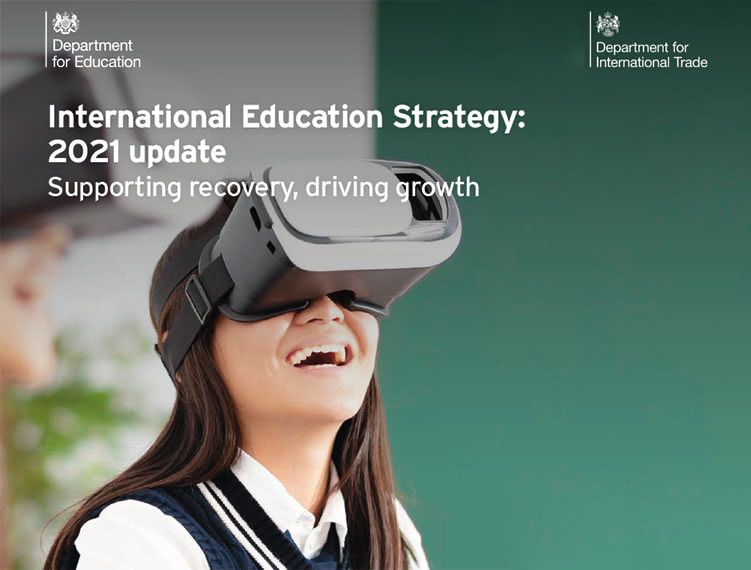International Education Strategy: Government sets out ambition for increased education exports

@EducationGovUK and @TradeGovUK have realeased (6 Feb 2021) an update to the 2019 International Education Strategy highlighting progress, government support to the UK education sector and future priorities.
Since the Department for Education (DfE) and the Department for International Trade (DIT) launched the ‘International Education Strategy: global potential, global growth’ in 2019 (Mar 16), the global context has changed.
This includes the effects of the coronavirus (COVID-19) pandemic, which has posed significant challenges for the education sector.
Our update proposes several areas to increase education exports recover and grow sustainably, including:
- enhancing the international student experience from application to employment
- a new international teaching qualification, International Qualified Teacher Status
- increasing export opportunities for UK chartered professional bodies and UK special educational needs and disabilities providers
- the Turing scheme, which will provide funding for students in universities, colleges and schools to undertake placements across the world
This 2021 update reaffirms our commitment to meet the 2 important ambitions set out in the 2019 report that by 2030 we will increase:
- education exports to £35 billion per year
- the numbers of international higher education students studying in the UK to 600,000 per year
Through this update, the government will work with the UK education sector to move from recovery to sustainable growth.
The International Education Strategy set out the government’s ambition for education exports and how it will support the UK education sector to access global opportunities:
- increase the value of education exports to £35 billion per year by 2030
- increase the total number of international students choosing to study in the UK higher education system each year to 600,000 by 2030
The strategy set out 5 cross-cutting strategic actions, developed through consultation with the education sector:
- Appoint an International Education Champion to spearhead overseas activity.
- Ensure Education is GREAT promotes the breadth and diversity of the UK education offer more fully to international audiences.
- Continue to provide a welcoming environment for international students and develop an increasingly competitive offer.
- Establish a whole-of-government approach by implementing a framework for ministerial engagement with the sector and formalised structures for coordination between government departments, both domestically and overseas.
- Provide a clearer picture of exports activity by improving the accuracy and coverage of our annually published education exports data.
These actions are supported with more specific actions, targeted at the respective needs and challenges of the different parts of the education sector. They are intended to help the UK build global market share across the education sector, from early years to higher education.
Following the announcement in December of the new £110 million Turing scheme, a new website has gone live with funding and eligibility details so that universities, colleges and schools to prepare for bids to open in Spring. The pioneering scheme will support students from across the UK and from all backgrounds to take advantage of the benefits of studying and working abroad from September 2021.
To help level up opportunities for more people, the scheme will look to target students from disadvantaged backgrounds.
The updated International Education Strategy, led by the Department for Education (DfE) and the Department for International Trade (DIT), will work alongside the scheme, focused on supporting the education sector to build back better from the pandemic by boosting global growth opportunities.
This updated strategy reaffirms the Government’s commitment to increase the amount generated from education exports, such as fees and income from overseas students and English language teaching abroad, to £35bn a year, and sustainably recruit at least 600,000 international students to the UK by 2030.
It also outlines plans for a new international teaching qualification (iQTS) so teachers around the globe can train to world-leading domestic standards and support growing international demand for high quality teaching. It also highlights recent changes including streamlining application processes and boosting job prospects for international students.
Schools, colleges and universities can now access details on the Turing Scheme including funding rates and eligibility criteria to help them to prepare applications for the new scheme ahead of the applications window opening in the next few weeks.
The updated Strategy’s measures to boost the UK’s world-renowned education exports include:
-
Launching a consultation for a new international teaching qualification, International Qualified Teacher Status (iQTS), to enable teachers around the world to train to domestic standards, supporting the sector to meet growing international demand for its high quality teacher training;
-
Promoting UK teaching methods for supporting those with special educational needs and disabilities (SEND) internationally;
-
Setting out priority countries for the International Education Champion, Sir Steve Smith, to work with, promoting growth for exports and addressing any barriers in the global market.
UK education providers can take advantage of schemes such as UK Export Finance’s General Export Facility, an export guarantee scheme that can be used by firms to help cover the everyday costs linked to exporting.
Further export support includes enhancing the international student experience from application to employment, connecting international demand for chartered body qualifications to UK education suppliers, and identifying specific Special Educational Needs and Disabilities (SEND) export opportunities for UK businesses.
Attracting inward investment will also form part of the sector recovery plans, with the government building on its promotion of the UK Education Technology sector and expanding into new sub-sectors, further stimulating foreign direct investment into all corners of the UK.
The International Education Strategy is supported by the Government’s ‘Education is GREAT’ trade promotion campaign, which represents the UK’s offer of education provision to prospective international students or trade partners in other countries. As part of the campaign, DIT has developed a virtual programme to support the global recovery of the education sector’s international activity.
Sector Response Feb 2021
International Education Champion, Sir Steve Smith, said:
I warmly welcome this revised International Education Strategy. Not only does it show the progress we have made since the launch of the original strategy in March 2019, but it outlines concrete measures to support the entire education sector across all parts of the UK to achieve the goals of at least 600,000 international students coming to the UK, and educational exports rising to £35bn by 2030.
Changes to the visa arrangements, the new iQTS, a focus on a set of priority markets and the launch of the Turing mobility scheme will all support making the UK an even more successful and attractive educational powerhouse.
Universities Minister, Michelle Donelan said:
In these unprecedented times, having a proactive global education agenda is more important than ever so we can build back better from the pandemic. Our world-class education is a vital part of our economy and society, and we want to support universities, schools, colleges and all aspects of the education sector to thrive across the globe.
We are committed to making sure our students, particularly those from disadvantaged backgrounds, can benefit from studying and working abroad. Working with the British Council, we will open up the globe to our young people, and I look forward to seeing the exciting and enriching opportunities the Turing scheme will bring.
I am also pleased to launch initiatives to enhance the experience of international students at our universities, from the moment they apply, to the first steps of their careers.
Minister for Exports Graham Stuart MP, said:
The UK offers world-class education. Thanks to our global reputation for excellence and strong presence in international markets, our education exports – from EdTech to transnational education – reached £23.3 billion in 2018.
I’m proud to lead the Department for International Trade’s education work, as our International Education Strategy aims to help the sector recover from the impacts of the pandemic. It’s vital we help the UK’s world-renowned education industry to build back better by exporting our brilliant goods, services, skills and innovation across the globe.
Chief Executive of Association of Colleges, David Hughes said:
The Turing scheme opens the world’s door to work and study placements for college students. This is an important part of ‘levelling up’ the life chances for all of our young people – whatever their background.
International mobility motivates and inspires young people to understand their place in the world, develop their life skills and build confidence and ambition. I strongly encourage colleges new to international exchanges to consider participating in Turing and hope that those who have been involved before can use this to extend opportunities for students.
Vivienne Stern, Director of Universities UK International, said:
I am very supportive of the International Education Strategy, which represents the next step in a joint effort by Government and the education sector to build on the international success of our education system and our attractiveness to international students. This approach has delivered real benefits already, including the introduction of the graduate route, and improvements to the visa system. Despite a very difficult year, interest in UK study has grown as a result.
The strategy is not only about attracting students to the UK. We particularly welcome the launch of the Turing Scheme, which will create new opportunities for students in UK universities to gain valuable international experience. We know these opportunities enable graduates to develop the skills employers need, and that the benefits are most pronounced for those from less advantaged backgrounds.
We look forward to continuing to be partners, working with our members, Government and others across the sector, to deliver the strategy.
Colin Riordan, Cardiff University Vice-Chancellor, said:
The government’s commitment to outward mobility for UK students is very much to be welcomed. The new Turing scheme will help our students achieve more in their degrees and become more employable, but the benefits are more than economic. Anybody who is involved in outward student mobility knows that spending time abroad can be a positively life-changing experience for our students.
Studying abroad enhances their intercultural awareness, their language skills, their tolerance and their professional networks. It also boosts confidence, self-awareness, independence, curiosity, flexibility and adaptability. The focus on widening participation in Turing is a major positive. The UK has never had its own, government-funded outward mobility scheme. Turing presents a historic opportunity to shape our own destiny, and we should seize it.
Kate Ewart-Biggs, British Council interim Chief Executive, said:
The Strategy is a welcome route map for where UK international education should put its efforts in the coming years. Importantly, the new Turing scheme, which the British Council will help to deliver, will enable thousands of students to study around the world. It will target and provide support to students from disadvantaged backgrounds, making life-changing opportunities accessible to everyone across the country.

Documents
International Education Strategy: 2021 update: Supporting recovery, driving growth
HTML
International Education Strategy: 2021 update: Supporting recovery, driving growth (pdf version)
PDF, 2.78MB, 35 pages
International Education Strategy: Plans to boost international student numbers and income
In 2019 (16 March) the Government published International Education Strategy: global potential, global growth, outlining plans to increase the number of international students studying in the UK by more than 30% – helping boost the income generated by education exports to £35 billion.
The Education Secretary at the time, Damian Hinds, and International Trade Secretary Liam Fox published the International Education Strategy to cement Britain’s leading role in the global market as it prepares to leave the EU and maximise the benefits to both the UK and students from around the world.
In 2019 the UK was hosting around 460,000 international higher education students and the education sector generated approximately £20 billion per year through education exports and transnational activity, which included income from international students, English language training, education providers setting up sites overseas, and education technology solutions being sold worldwide.
The strategy set out an ambition to grow the total number of international students during the year to 600,000 and generate £35 billion through education exports by 2030 – a rise of 75%. The plans focus on not only retaining existing markets such as Europe, but raising the profile of the education sector in global markets such as Asia, Africa and Latin America.
The strategy includes a number of measures to help the sector maximise the potential of UK education exports abroad, including:
- Appointing a new International Education Champion to boost overseas activity by developing strong partnerships and tackling challenges across the world;
- Encouraging sector groups to bid into the £5 million GREAT Challenge Fund to promote the entire UK education offer internationally;
- Extending the period of post-study leave for international student visas, considering how the visa process could be improved for applicants and supporting student employment;
- Improving data on education exports to enhance and drive performance while also mapping out where the best opportunities lie globally; and
- Closer working across government departments on international education policy and opportunities.
There is no limit on the number of international students that can study in the UK, and to ensure the UK continues to attract and welcome them, the post-study leave period will be extended to six months for undergraduate and masters students attending institutions with degree awarding powers, and a year for all doctoral students. The strategy also looks at ways of supporting international students into employment.
The value of education related exports and transnational education (TNE) activity has grown steadily since 2010. Total education exports and TNE activity was estimated to be almost £20 billion in 2016 (in current prices), marking an increase of 26% since 2010.
In August 2018, the Department for International Trade launched the government’s wider Export Strategy, which sets out how the government will support businesses of all sizes to make the most of the opportunities presented by markets around the world.
Sector Response in 2019
Damian Hinds said:
“The UK’s education system is world-leading and its reputation is the envy of many countries around the globe.
“As we prepare to leave the EU it is more important than ever to reach out to our global partners and maximise the potential of our best assets – that includes our education offer and the international students this attracts.
“There is no limit to our potential and this strategy will help cement our status as a world-leader in education, while creating real benefits for the country and students across the globe.”
Dr Liam Fox said:
“There is clear demand across the globe for the UK’s world-class education offer. From English Language Training in Latin America to Higher Education partnerships in Vietnam, Trade Minster Graham Stuart and I have encountered a remarkable amount of enthusiasm for British education goods and services across the globe.
“Our education exports are ripe for growth, and my international economic department stands ready to engage and support UK providers from across the education sector to grow their global activity as we implement this new International Education Strategy.”
Professor Dame Janet Beer, said:
“I strongly welcome the publication of this strategy as a signal of a change in direction. I particularly welcome the ambitious target to grow the number of international students to 600,000 by 2030 which sends a strong message of welcome.
“International students contribute a huge amount to the UK, not only economically but also by enriching the international education environment in our universities for all students. Whilst their presence in the UK is worth an estimated £26 billion in direct and knock on effects, sustaining over 200,000 jobs in all parts of the UK, they bring much wider benefit to our academic and civic communities.”
Lesley Davies OBE, said:
“It is heartening to see the ambition the government sets out in its International Strategy for the UK skills sector and the recognition of our track record of success in delivering high quality technical and vocational education and training solutions to international partners and businesses.
“The UK Skills Partnership is delighted to see that both the Department for International Trade (DIT) and the Department for Education (DfE) have worked together on this strategy. We welcome the commitment made by government to play a more active role in supporting the UK’s skill’s sector international business and we stand ready to deliver on this important agenda.”
Documents
 International Education Strategy: global potential, global growth
International Education Strategy: global potential, global growth
HTML
International Education Strategy: global potential, global growth
PDF, 1.4MB, 48 pages
Policy updates
Read the International Education Strategy: 2021 update highlighting progress, government support to the UK education sector and future priorities.
Published 16 March 2019
Last updated 16 February 2021 + show all updates
-
Added the link for the International Education Strategy 2021 update.
-
First published.











Responses